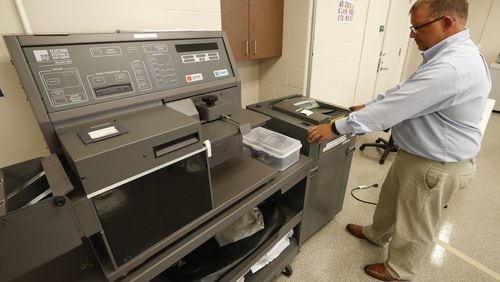Georgia is in line to receive more than $10 million in federal funding to upgrade its voting machines and make other security improvements ahead of the upcoming elections, the U.S. Election Assistance Commission announced Thursday.
The independent agency said Georgia would receive $10.3 million in federal grants from the recently signed fiscal 2018 government spending bill, combined with $515,000 in matching funds from the state.
The grant money could be used to replace electronic voting machines with ones that provide a verified paper record, the feds said. It could also be used to implement a post-election audit system to ensure accurate final vote tallies or to make upgrades to computer systems in order to address cyber vulnerabilities.
“This much-needed funding will provide states with essential resources to secure and improve election systems,” said Thomas Hicks, the chairman of the Election Assistance Commission. “The EAC is committed to making these funds available as soon as feasibly possible, and we fully expect this money will be deployed in meaningful ways to support the 2018 elections.”
The federal funding comes from a $380 million pot of money Congress set aside for local election security efforts in the $1.3 trillion spending measure President Donald Trump signed into law late last week. Cybersecurity experts have praised the new grants but warned that the money represented only a fraction of the investment that’s needed.
Georgia’s voting system has long been criticized for being outdated and vulnerable to hacks. The state’s current voting machines rely on memory cards that don’t leave a paper trail, meaning there’s no way to verify the accuracy of election results, and they use the Windows 2000 operating system, which is no longer supported by Microsoft.
Georgia is one of only five states to rely entirely on direct-recording electronic voting machines that don’t leave a paper trail.
Cost estimates for replacing the state’s 27,000 voting machines have varied from $35 million to well over $100 million.
Candice Broce, a spokeswoman for Georgia Secretary of State Brian Kemp, said the office has already taken steps to safeguard the state’s election systems and that it will use the new federal funding to “ensure that our local elections officials have the tools necessary to continue their hard work and do the same in 2018.”
Georgia lawmakers on Thursday were considering legislation that would change the state's voting system before the 2020 presidential election, but it was unclear whether the measure could pass before the Legislature adjourned for the year at midnight.
Critics of the measure, Senate Bill 403, say it falls short of the goal of protecting elections because it could allow state officials to buy a voting system that would rely on hackable machines to print ballots. But supporters of the legislation say it would provide for a secure paper balloting system in time for 2020.
Election security has been a major topic of discussion in Congress after the U.S. Department of Homeland Security said that Russian hackers targeted election systems in 21 states in August 2016. Georgia wasn’t one of those states, but it’s had its own data security issues in recent years.
In 2017, a private researcher discovered security lapses at Kennesaw State University's Center for Election Systems that could have exposed more than 6.5 million voter records and other sensitive information.
Intelligence officials fear that hackers could target voter registration databases and other local election infrastructure during the 2018 midterm elections.
The Election Assistance Commission, the bipartisan agency tasked with ensuring secure and accurate elections, said Thursday it determined how much money each state received through a formula that accounted for the voting-age population.
Stay on top of what’s happening in Georgia government and politics at PoliticallyGeorgia.com.









